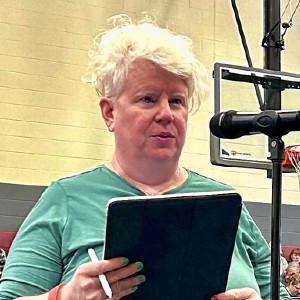At Katmandu Bazaar, food helps bring cultures together
|
Published: 09-17-2024 5:36 PM
Modified: 09-17-2024 10:16 PM |
Editor’s note: Ahead of Sunday’s Multicultural Festival, the Monitor will highlight individuals and organizations that make Concord a more welcoming and inclusive community in a series of stories called “Welcome to Concord.”
As Karma Gonpo walked the aisles of Katmandu Bazaar, he talked through an atlas of aromas.
Sachets of curry powders lined one shelf. Cassava flour, peanut powder and red palm oil come in bulk for his African customers. In the fridge, shoppers can choose from stockpile of mango lassi, Taiwanese bubble tea and spicy ginger juices.
Recently, he’s watched Wai Wai noodles from Thailand and Buldak Ramen from South Korea fly off the shelves.
“These you don’t find in the local Market Basket,” he said. “They don’t have any.”
In an unfamiliar place – a new country and community – food is a common comfort. The sound of an okra soup bubbling on the stovetop in a kitchen can make it feel like home, Gonpo said.
In 2010, he moved to Concord from New Jersey. He knew four people here and came in pursuit of purchasing a gas station that was for sale on Loudon Road.
The station had a small building for a market on the lot. Driving through Concord, Gonpo noticed the city had no Asian grocery store. So he converted the market into one, and Katmandu Snack Shop was born.
Article continues after...
Yesterday's Most Read Articles
 ‘There was no oversight’: NH child advocate has been a watchdog for children's care. Now, the office is on the chopping block
‘There was no oversight’: NH child advocate has been a watchdog for children's care. Now, the office is on the chopping block
 Volunteer group wants to help homeless clean up their camp
Volunteer group wants to help homeless clean up their camp
 ‘Less finger pointing, more communication’: Longtime Chichester residents share hopes before second town meeting
‘Less finger pointing, more communication’: Longtime Chichester residents share hopes before second town meeting
 Casella Waste Systems’ landfill project in New Hampshire’s North Country denied permit
Casella Waste Systems’ landfill project in New Hampshire’s North Country denied permit
 New Healthy Buffalo owner to build market in Chichester
New Healthy Buffalo owner to build market in Chichester
 ‘It’s everything’: In largest rally yet, Trump protestors descend on Concord
‘It’s everything’: In largest rally yet, Trump protestors descend on Concord
He owned a business, but not a house. He had customers but little community.
“Back then it was very difficult,” he said. “I was coming to a new place and I didn’t have anything. I only had four friends. I struggled a lot.”
Moving here meant leaning on others until he could find an apartment of his own. But word spread fast about his business – customers started bringing him photos of products they hoped he’d offer.
Gonpo would hit the road once a week to New York to purchase items for his inventory.
In 2014, he expanded, opening Katmandu Bazaar in Lamplighter Plaza on Loudon Road. This year will mark a decade at the same location with the Asian and African market in the front and the small restaurant selling momos, samosas and ramen noodles in the back.
The name is a nod to the Tibetian capital, with one slight caveat – he purposely removed the H from the spelling.
“Mine is a little bit different,” he said. “So many stores use the name Kathmandu.”
In the last 10 years, Gonpo has stopped his weekly drives to New York. He now buys from vendors across the country who will deliver.
In the middle of the night on Thursdays, he still drives down I-93 to Boston – often waking up at 2 a.m. – visiting the New England Produce Center in Chelsea and stopping in Lawrence, as well, for specialty produce.
Vegetables like Chinese eggplant are sometimes available at Market Basket but freshness and consistent availability make a difference to his customers.
As Gonpo’s business has grown, so has the community he serves.
When Gonpo immigrated to the United States from Tibet in 2010, Concord was 93 percent white, according to Census data. Less than 1,000 people in the city’s population of nearly 42,000 identified as Black. More identified as Asian – 1,450 to be exact which was just over 3 percent of the community.
Gonpo watched as the community grew, as more people moved to New Hampshire to join friends, cousins and siblings who had already laid the foundation for a life here.
The city remains predominately white, but less so – 90 percent, according to 2020 Census data. The number of people who identify as Black has nearly doubled and the Asian community has also grown.
With new immigrants from different countries, the city’s cultural diversity has evolved, just as the inventory on Gonpo’s shelves has evolved.
He now has a large network of 40 close families. Over long weekends, they’ll head north to the White Mountains together where he’s hosted soccer tournaments, and archery competitions, complete with trophies and medals, some of which now hang on the shelf above the cash register at Katmandu Bazaar.
“We have a big community here,” he said. “It’s very helpful, and if some people move over here they help them to find a job, find a house.”
An annual public event right down Loudon Road signals the growth, too – Concord’s Multicultural Festival, which celebrates the region’s diversity. Katmandu is one of a dozen food vendors at the festival again this year.
At the festival, a parade of flags showcases the emblems of over 70 countries. On the wall in back restaurant, Gonpo has his own global display.
Collaged along the perimeter of a world map are different currencies signed by the customers who brought them in and hung them up.
Gonpo laughed as he pointed to examples - “they’re from everywhere” – a thousand Indian rupees, a 10-pound British note, 5,000 Vietnamese dong.
On a $1 bill, a customer signed something that appears to be a universal sentiment from Gonpo’s customers:
“The best spot in town.”
















 Henniker ponders what is a ‘need’ and what is a ‘want’
Henniker ponders what is a ‘need’ and what is a ‘want’ Boscawen residents vote to fund major renovation of public works building
Boscawen residents vote to fund major renovation of public works building ‘Voting our wallets’: Loudon residents vote overwhelmingly against $1.7M bond for new fire truck
‘Voting our wallets’: Loudon residents vote overwhelmingly against $1.7M bond for new fire truck In Pembroke, Education Freedom Accounts draw debate, voters pass budget
In Pembroke, Education Freedom Accounts draw debate, voters pass budget
